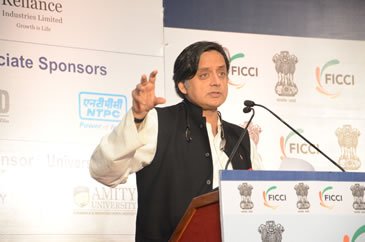Varsities should do research in industry-sponsored ideas : Shashi Tharoor
July 26, 2013 | Friday | News | By Rahul Koul Koul
Varsities should do research in industry-sponsored ideas : Shashi Tharoor
Making his point Shashi Tharoor, minister of state for human resource development
Mr Shashi Tharoor, minister of state for human resource development, has suggested that the private sector should ask universities to
undertake research on an industry-related idea and their R&D efforts could be rewarded by absorbing the student-innovators in companies sponsoring the research.
Tharoor was speaking at the 'Global R&D Summit 2013 - Destination
India' organized by Federation of Chambers of Commerce and Industry (FICCI) in association with department of science and technology (DST), government of India at New Delhi on July 25, 2013. . He said that India ranked poorly in terms of global R&D expenditure. While the figure was 33 per cent for the US, 24.5 per cent for Europe, 12.5 per cent for China and Japan , India's R&D spend was a meager 2.1 per cent for India. Also, FDI flows into R&D in India stood at 0.5%, according to a Wharton report published in 2005.
Dr Tharoor ascribed this situation to the fact that "for far too long we have taken the complacent view of the role of R&D in nation building."
"The challenges of the 21st century for India were tackling the demand for food and water and eradicating poverty and illiteracy," he said and added that several Bill pertaining to education were pending in Parliament. These needed to be debated and passed by the two houses. Once this happens India's education sector, including technical education, will undergo a sea change.
On the occasion, Dr. Tharoor released the FICCI-Battelle Knowledge Paper on 'India's Emerging Competitiveness as Destination of Global R&D'.
Dr R. Chidambaram, Principal Scientific Adviser to the Government of India, in his keynote address emphasised the need to put R&D high on the national agenda, backed by high quality manufacturing skills and leveraging international cooperation to reap the advantages of the third industrial revolution.
He said that India was beginning to realise that it not enough to get proven technologies, a synonym for obsolete technology and the benefits that can be reaped from being the first mover in the R&D space.
Dr. Chidambaram said the third industrial revolution that is being witnessed now is bring driven by the internet, digital manufacturing and other advanced technologies as also by the desire to develop green technologies.Dr. T. Ramasami, Secretary, Department of Science & Technology, who gave the theme address,pointed out that the need of the hour was to convert knowledge into wealth. He said that majority of research was currently focussed on achieving excellence.It was important to channelise the fruits of technological excellence into the prosperity
of the people.
He also stressed on the need for making innovations affordable so as to rach the benefits to the masses. Dr Birendra Raj Dutt, Chairman & MD, APIC, USA, underlined the need to cultivate researchers who work on mission mode, have commitment to leadership and consider
promotion of R&D as a national effort.
He said 'Being First' in R&D requires courage to try hard and a profienct understanding of technology that provides the ability to s and execute the future and an understanding of how to execute large, new projects.
Ms. Naina Lal KIdwai, President, FICCI, suggested that the National S&T policy should be oriented towards 'output directed development path', as opposed to 'input driven strategy' followed up till now. Basic research should be followed on 'goal oriented approach' to connect knowledge generation with wealth generation and practical problem solving and Government funding policy in R&D should have a 'venture funding
model' for private sector projects (particularly for SMEs) as adopted by some developed countries, she said.
She said that India's public spend in R&D is below average of China, South Korea and most Western countries. It was therefore imperative that the Government should stick to its commitment for steady increase in budget outlay for R&D and double current investments over next 5-8 years. Further, India's private sector investment in R&D is less then 25% of overall R&D spend. It was therefore necessary to create an aggressive
policy environment for boosting private sector investment in R&D. Apart from the existing R&D offset credit policy for industry, there should be adequate tax-break incentives and a fast track patenting facility for breakthrough innovations. The government should introduce legislation for allowing public sector scientists to file patents, create new enterprises and share financial returns of their inventions, the FICCI chief pointed out.
Ms. Kidwai said that there is considerable lack of industry-academia-public lab linkage in the R&D ecosystem, leading to low competitiveness. The Government, she said, needed to introduce structured platforms for open collaboration between all R&D stakeholders under different S&T sectors and facilitate researcher exchange from academia and public labs to industry and vice-a-versa to create better synergy in public-private and
basic-applied R&D.The inaugural session of the two-day conference was also addressed by Dr. Marakand Phadke, Chairman, FICCI National Committee on S&T/Innovation and Senior Vice
President-Innovations, Reliance Industries Ltd. and Dr. A. Didar Sigh, Secretary General, FICCI.
The two-day summit has brought together local and global R&D experts from government, industry and academia, along with key stakeholders such as policy-makers, business leaders, innovators, entrepreneurs and investors constituting the R&D ecosystem. It is exploring the emerging role of scientific and industrial R&D as cornerstone for economic development of the country and create an international platform for open exchange of ideas, best practices and strategies with various stakeholders across the
globe.
The exhibition organized alongside the summit is showcased some of the most innovative and successful R&D projects, programs and initiatives from government, industry and academia and offers a high-level networking and business opportunity platform for participants.









